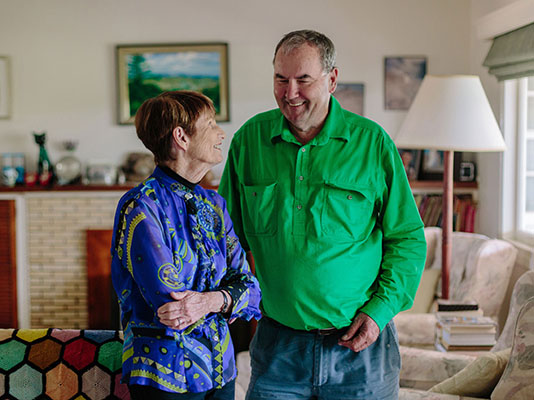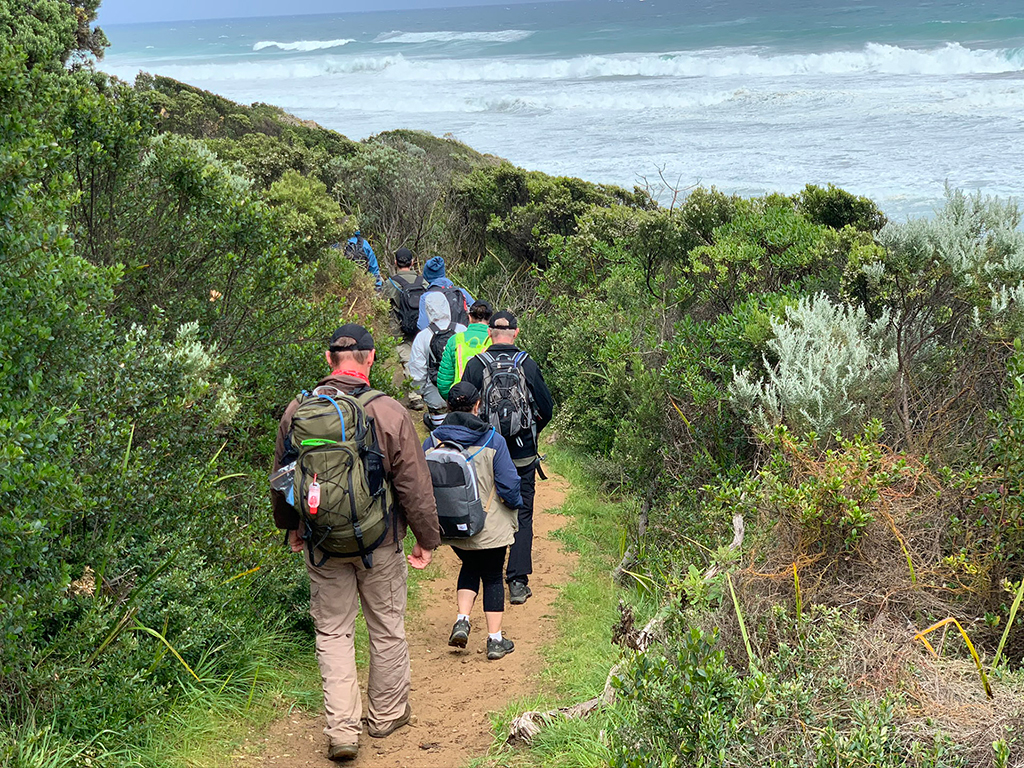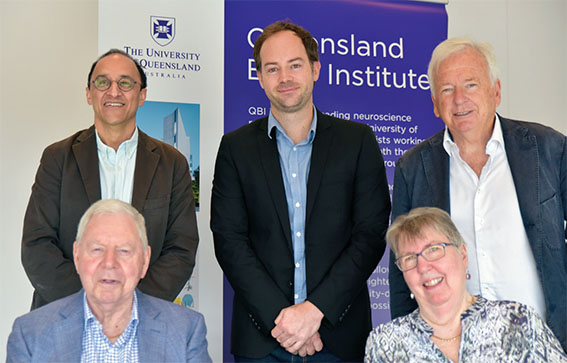The diseases we research impact people's lives
Our researchers are dedicated to improving lives through neuroscience. Thanks to the generosity of all our donors, that we can continue our legacy of ground-breaking research.
Brazil Family Foundation

Recognising stroke and motor neurone disease (MND) had only limited treatment options and no cures prompted Lyn and Bobbie Brazil to establish the Brazil Family Program for Neurology in 2017. This enabled us to recruit world-leading researchers and support four laboratories.
Dr Adam Walker’s laboratory has defined some of the early triggers of MND to enable the best targeted approaches for therapies and identified ways to prevent the abnormal accumulation or improve the removal of a protein that causes motor neurons to die.
Dr Tara Walker is examining whether the dietary supplement selenium can prevent or decrease cognitive or motor deficits following stroke.
Dr Matilde Balbi aims to understand how stimulating the cortex in different ways reduces the loss of brain cells after a stroke and whether this mitigates behavioural deficits.
Professor Gail Robinson’s stroke research aims to improve cognitive assessment tests used to evaluate stroke survivors, in the acute phase, to predict long-term outcomes and to develop more targeted, personalised therapy strategies. Professor Robinson also aims to improve our understanding of the biological basis of MND.
The Brazil Family have also donated generously to our Alzheimer’s disease research. This gift contributed to Professor Jürgen Götz and his team’s ground-breaking therapeutic ultrasound approach to target dementia. This research has identified a range of potential applications for ultrasound, including delivering drugs into the brain. The intention is to modify disease progression and ultimately cure brain diseases.
Discovery research leads to the health outcomes of the future, but it takes time and support. Researchers need preliminary data to support their applications for grants. With government grant funding becoming harder to secure , scientists with promising research potential are being lost.
Funding of researchers who narrowly miss out on government grant funding could hold the key to major breakthroughs and, with support, could continue to explore new avenues and build the data needed to be successful in subsequent grant rounds.
The Brazil Family Foundation understands the power of “near-miss” applications and are supporting our scientists with a gift which enables them to continue collecting valuable data to improve their grant success in future funding rounds.
The whole of the QBI community pays tribute to the Brazil Family Foundation whose generosity and support enables us to continue our pathway to expanding our understanding of the brain, the underlying causes of brain disease and help develop new treatments which will benefit the community at large.

Great Ocean Walk, raised over $125 000 to support
brain research.
NFIA Trekkers do the hard yards for QBI
Through the hard work of Brian Davies, a successful businessman and immediate past-president and patron of the National Fire Industry Association (NFIA), and his wife, Liz, QBI was the joint-recipient of a donation of over $250 000 in 2019.
This incredible effort was the result of the NFIA Patron’s Walk held in October, which may sound like a scenic walk in the park but Brian, Liz and seven other NFIA members spent three days enduring driving rain and winds of close to 50 knots coming straight from Antarctica.
The idea for the walk came while the couple were completing the Three Capes Walk to raise money for the Queensland Brain Institute in 2018.
On that walk, Liz suggested to Brian that as the patron of the NFIA, he could create his own walk for charity. Mr Davies believes that corporate Australia has a big responsibility to give back, which is testament to the success of the inaugural walk. The money raised was shared between the Queensland Brain Institute and the Gallipoli Medical Research Foundation (GMRF).
The NFIA walk is the first of three walks to raise money for research at QBI and GMRF, with the aim of raising $500 000 in three years. The donation from the NFIA walk will help QBI’s research into motor neurone disease, dementia, Parkinson’s disease, stroke and QBI’s Discovery Research Endowment fund, which enables fundamental research into major health issues, including depression, anxiety, PTSD and epilepsy. QBI is extremely grateful to Brian and Liz and the NFIA team for their support.
The NFIA walk is the first of three walks to raise money for research at QBI and GMRF, with the aim of raising $500 000 in three years.
The Stafford Fox Medical Research Foundation

(QBI Director) and Dr Steven Zuryn and Emeritus Professor Perry Bartlett AO (back row).
In 2019, The Stafford Fox Medical Research Foundation confirmed its continued generous support of the prestigious $2.5 million philanthropically funded international fellowship to Dr Steven Zuryn at the Queensland Brain Institute to fight stroke-induced dementia, also known as vascular dementia. The Foundation also continues to support the work of Emeritus Professor Perry Bartlett’s research into prevention of dementia in ageing by improving cognition through exercise.
The Stafford Fox Medical Research Foundation was established in 2013 following the death of Moyna Fox, and named in honour of her late husband, James Stafford Fox, a former BP Australia chief executive.
Stafford and Moyna Fox started one of Australia’s wealthiest medical research foundations after many years of careful planning, resulting in a fund worth over $100 million. It was only publicly revealed in Moyna’s will when she died in 2013, many years after her husband.
James Stafford Fox was a private person, tall, physically imposing, but without a, particularly dominant personality. He rose from a position as a junior clerk at the Port Melbourne depot of the Commonwealth Oil Refineries (COR) in 1932, to become the first Australian chief executive of BP Australia Ltd in 1971.
James Stafford Fox spent three years at the helm of BP Australia, and retired in 1974 at age 60, remaining on several boards until 1985. By 1990, he was in poor health, suffering, among other things, from dementia. He entered a nursing home and died in 1994. By that time, he had already charted the course that would lead to the establishment of the foundation. Moyna lived on for more than 18 years, knowing what would happen after her death, but never revealing it publicly. Eventually, she too succumbed to dementia and died in 2013. The couple, who were so careful with their money and who clearly had no desire for fame and prominence during their lifetime, will now forever be remembered for their generosity in setting up the Stafford Fox Medical Foundation.
The Foundation’s support of QBI is crucial in enabling Emeritus Professor Bartlett and Dr Steven Zuryn to continue their work in finding solutions for the growing challenge of dementia today. This cutting- edge research is helping put Queensland and Australia at the forefront of world medical research.
What your donations fund
Your support can help us achieve a range of achievements

World leading research

Brightest scientific minds

Solutions to global health challenges
"I think it is important for people with dementia, their families and carers, to know that they are not forgotten, and that there’s a lot of work going on behind the scenes at QBI to try to unravel the tangled web that is dementia."
– Robyn Hilton (established the Peter Hilton Senior Research Fellowship in Ageing Dementia)
Hear from one of our supporters
Jeff Maclean, Chair of QBI Advisory Board
Got a story you would like to share?
Are you a donor or supporter of QBI and would like to share your story? We would love to hear from you!
Research in action
- We talk to neurologist and researcher Professor Peter Silburn about OCD and how deep brain stimulation, like in Parkinson's disease, could help those with the most severe form of the disorder.
- Are there such things as ‘visual learners’ or ‘auditory learners’? What does the science say?
- PhD StudentQueensland Brain Institute

